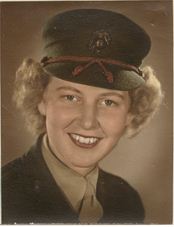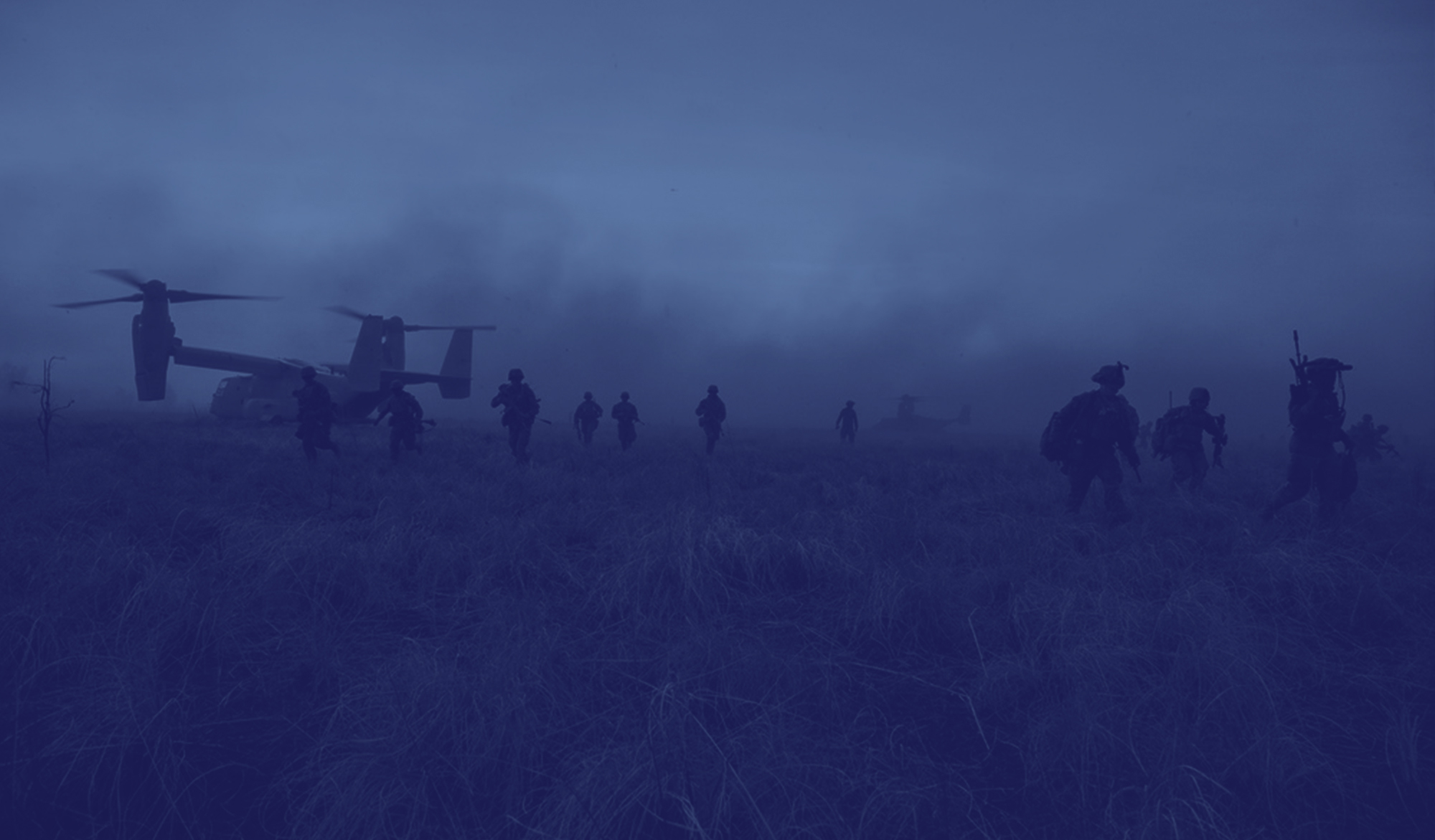

Prior to going in the Marine Corps, I had served as a USO Junior hostess and also belonged to a group of Boeing Aircraft Company employees who banded together to give variety shows at war centers in the Seattle area. I played guitar and sang. When I joined the Corp I donated my guitar to the Navy Hospital.
Our boot camp training was not nearly as rigorous as that of the women Marines today, but for someone who was never very athletic and had been working at a desk job for two years, it was pretty formidable. The first week I thought I was going to die and the second week I was hoping I would. Our boot camp was filled with classes on military protocol, military history, history of the Marine Corps, close order drill and physical endurance training. The gas chamber drill was the worst experience and all of us remember that one vividly. Throughout it all, it was emphasized that we would be Lady Marines and would do nothing to disgrace the uniform of a United States Marine. After boot camp I was given the assignment from Hell–two weeks of mess duty! I was washing trays from first mess in the morning until last mess in the evening, then the whole mess hall had to be cleaned up for the next day. The weather at Camp Lejeune that time of year is anything but balmy. Where I was working, over large stationery sinks, the temperature sometimes got up well over one hundred degrees. If we managed to finish the dishes before the next mess, we would be given a break and we would lie down on the cement floor for a brief nap, as that was the coolest place in the whole building There was no air conditioning or fans in those days in the buildings. We had to walk a mile from our barracks to the chow hall and back again, late in the evening, when we were dead tired from working all day. I lost ten pounds in that two weeks.
After my two week stint on mess duty, I was assigned to US Marine Corps Base in San Diego, Calif. where I went to Sound Motion Picture Technician’s School at US NAVTRACEN on the Navy base which was adjacent to the Marine Corps Base. There were ten of us WRs, two WAVES and one SPAR training with one male Marine and twenty-four sailors. There we learned to operate the 35 MM projectors used in theatres, 16 MM projectors used for training film, set up sound systems and repair and maintain all of the equipment. When we had completed the course, the officer in charge told us that we all were competent enough to work in any theatre in the U.S. except, he added, “You women would never be hired because it is considered a man’s job.” We were constantly being told by our superiors that in order to be accepted by the men we had to be twice as good as they were in our jobs, so we studied very hard and most of us exceeded the men in our grades. Toward the end of the war, one of the generals, who had been the most outspoken against having women in the service, was reputed to have said, “Send me one woman to work and I can let two men go fight.”
I graduated from SMPTS on September 15 and was placed on standby while waiting for further orders. Since the Marine Corps is not an organization that lets its members sit around idle, we were given various chores such as scrubbing out garbage cans, cleaning the area, moving linens from the downstairs linen closet to the upstairs and the next day reversing the procedure, and various other chores. My orders eventually arrived and I was assigned to the United States Marine Corps Air Depot at Miramar, CA. There were three of us from the school sent there and upon our arrival we found that the SMPT duties were already filled so I was assigned to the directory service in the base post office which is where I worked until I was discharged on Nov. 23, 1945.
At that time the base at Miramar was not an airfield like it is now. It was the processing point for all Marine Corps Air personnel going to the South Pacific and coming back to the states for reassignment. Consequently, there was a constant flow of mail going both ways, which had to be re-addressed to reach the recipient. Since the mail was the life blood and morale booster of the men overseas, it was very important that they get their mail as rapidly as possible. I started in the post office re-addressing mail but was soon promoted to “Change Sheets.” There were five or six of us girls on that duty and we received all of the company rosters (called “change sheets” because they reflected all of the changes within the company, ie: killed, missing in action, wounded and sent to a hospital or home, transferred to other duty stations, punishments, etc.) Very interesting but heartbreaking as in the case of the bombing of the carrier “Franklin”, when we lost 1200 Marines on that one ship. The “killed in action” bags mounted up but we weren’t allowed to send the mail back until the Franklin made it back into port, as they didn’t want the Japanese to know that they had not sunk it. Every day we had to face a growing pile of “killed in action” mail when we came to work. Even now, it hurts my heart to talk of it.
Our job was to take the change sheets and make the changes on the IBM card the girls had in their files. All of this was done manually in those days so around the holidays, when we were flooded with returned mail and packages, we sometimes worked 15 hour days and sometimes 7 days a week…and no overtime pay! There were two squadrons of women Marines at Miramar, AWRS-4 and AWRS-5, and we alternated on having the duty on weekends. If you had the duty that meant you couldn’t leave the base and had to work half days on Saturday. There were about 500 women Marines stationed there at the height of the war.
Since Miramar was a staging area for all Marine Air personnel going overseas and coming home, we had a lot of revues to stand when the men came back and farewell dances when there was a new group going over. I loved to march and would often stand in for one of the girls if she had a date and could get a liberty pass.
San Diego was sixteen miles from Miramar and the base ran a “cattle wagon” to transport Marines to and from there. This was a semi trailer with seats along the sides, which made for a rather rough ride when the driver was in a hurry to get there. Most of us preferred to hitch a ride at a shelter outside the gate, which was termed a waiting station. It had painted in large letters on the side “Give ‘em a lift” and many people did. In San Diego we went to movies, danced to name bands at Pacific Square, a large dance hall, and frequented the many bars. The town seemed to be populated mainly by Marines, sailors and soldiers with the civilians just there to take care of their needs such as food and entertainment. If we had an overnight pass, we would usually go to an all night movie to spend the night as the USO was not equipped for women to stay there. When on the base, in our leisure hours we attended the base theatre or went to the “slop shop” where they served beer and sodas and there was juke box music to dance to. As I mentioned before, we had frequent base dances and sometimes they would run a bus to take us to dances at Camp Pendleton and Camp Elliott. Since I liked to dance, I was frequently on those buses. At one of the trips to Camp Pendleton I met John Basilone, Medal of Honor recipient, who was on his was back to the Pacific where he was killed at Iwo Jima.
When I was stationed in San Diego I tried out for and made the drill team. We practiced many hours on the parade grounds, always in the evening when all of the rest of the activities were over. At one time we performed at the Balboa Stadium when the East-West units of the Redskins played their annual Shrine benefit game. The San Diego newspaper said, “Between halves the MCB band will play and a crack 40-unit WR drill team under the direction of Lt. Emily Schultz will perform.” What never made the news was that we did not perform to the satisfaction of Lt. Schultz and when the game was over we got in the bus, went directly to the parade grounds and marched until dark. No chow, no break. From then on we were perfect.
At Miramar they formed a women’s pistol team with the idea that the other bases would also form teams and we would have competition. Since we had to be on the range at 4 a.m. on Sunday morning and the male Marines, who were our instructors were, not very happy about having to coach women Marines, that idea did not get very far. I was disappointed as I was a pretty good shot and was looking forward to being in competition.
In July, 1945, while swimming at the base pool, I dived from the 3 meter board, hit the water wrong, and broke my right arm. I was in sick bay from then until after the war ended. Even in sick bay, I was not allowed to sit around and feel sorry for myself. I had “the head” duty which meant I had to keep the rest rooms for the women’s area clean. I told the Navy nurse I had a broken right arm and her reply was, “You’ve got a good left arm so you are in charge of the head.” When I wasn’t polishing mirrors and cleaning toilets they gave me capsules to fill with a medical powder and bandages to roll. When I ran out of work, I did a lot of reading. When the war was finally over, one of the nurses brought in a bottle of liquor and two other girls, who were patients also, and myself got gloriously drunk.
When I got out of sick bay, I had some leave time coming so I went to Georgia to visit a 1st Division Marine I had met when I was stationed at the Marine Corps Base in San Diego and whom I had kept up a correspondence with. A week after I got there we got married. The following week I reported back to Miramar and put in for a discharge. I received my honorable discharge on November 23, 1945 and, after a brief visit home to Oregon and Washington, I returned to my husband in Georgia.
I was promoted to the rank of PFC on September 13, 1945 and my pay at the time of my discharge was $54 a month. I was given $143.02 travel allowance to return home and a mustering out pay of $100.00. I enjoyed my tour of duty in the Marines. It was one of the best times of my life and the pride I felt in wearing the Marine Corps uniform is indescribable.
Semper Fidelis!
Golda (Hammell) Fabian
